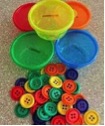TIPS FOR PREPARING FOR NWEA TESTING
End of the year testing can be a little scary for students and their parents. At the mere mention of the word “test” some people start to break out in a cold sweat. But preparedness and practice can reduce that stress greatly and help a hurdle become a stepping stone. How can we minimize testing stress and maximize success? I’m glad you asked.
The first step for preparation is to know why we test and how we use the results. At Circle Christian School, we currently use the Northwest Evaluation Association (NWEA) test at the end of the year. Their site clearly explains the purpose of this test: “The purpose of the NWEA MAP test is to measure a student’s achievement and growth over time. It can uncover what every student needs to move forward academically and can be used as a tool to inform instruction” (www.nwea.org). So how do we explain this to our kids? We simply tell them that the end of the year test is not one that they will pass or fail, nor one where they have to quickly memorize a bunch of facts, but it is one that will measure their overall learning throughout the year so that we as parents can decide if we need to change our teaching for the next year. That’s it! (Here I would like to point out that as a former public school teacher, the end of the year tests were not, in my opinion, an opportunity to alter instruction for the better. This is the beauty of homeschooling; we can actually use these tests for the betterment of our children’s education and not just to determine where funding should be issued and revoked. How about that!)
Now that we figured out and processed with our children the why, we need to talk about the how. According to Miguel de Cervantes, “To be prepared is half the victory.” When it comes to testing, I would agree. A portion of testing that frustrates me as a teacher and a parent is that sometimes kids are tested by the instrument itself and not actually the material. This happens when the test itself has never been seen by the student. The combination of trying to figure out how the test works along with figuring out the answers is not a recipe for success. This is why practicing with the type of questions that the test will be asking in the same manner is essential. For instance, the NWEA website has a brief video tutorial of a cartoon teacher and student discussing the test and how he would go about best answering the questions. This is followed by practice questions. (https://warmup.nwea.org/) This exposure should be done with the parents by the students’ sides so that they can talk about testing strategies: read all of the answers, for example, rather than stopping at the first one they think is correct, take an educated guess by eliminating clearly wrong answers, read the question before reading the passage so they know what to look for. And parents need to remember that the internet can be your friend in this instance. There are many testing practice sites for NWEA and all other tests that are free or very inexpensive in order to help prepare students and relieve the stress of the unknown.
Here are a few examples:
https://www.khanacademy.org/resources/parents-mentors-1#khan-academy-accounts
https://www.khanacademy.org/mappers
https://www.varsitytutors.com/map-practice-tests
https://www.testingmom.com/tests/nwea-map-test/sample-nwea-map-practice-questions/
Another factor to consider is the important process of review. Reviewing regularly throughout the year is ideal, but it is certainly never too late. The simplest form of review is conversation, believe it or not. Discussion results in learning and retaining more information than simply reading. And if you can get your kids to explain their learning to others, to actually teach it, the understanding and retention is even greater. Although information taught from one classroom to another is varied, grade level expectations that you can find on your state’s website that are used to guide the various curricula feed into standardized tests so that all review of the year’s learning is a good review.
To further set your child up for the victory, remember the small things that have been proven to make a big difference. You know how you feel an hour or so after eating a high sugar/high carb meal or dessert? Yeah, it’s not good. Make sure that your child eats a healthy protein based meal that will stabilize blood sugar rather than spike it. Choose the time that works best for your child if you have a choice in the matter. (The NWEA is offered at 9 am and 12 pm for Circle students.) In addition to time, place is a huge factor. Many tests are done on a laptop nowadays which is highly portable. A quiet, low traffic room with electronics set on mute is ideal. And a good night’s rest can only serve to help here as well. If being prepared is truly half the victory, your students will be halfway to success before they even start the test with these proven tips.
Prior to the test, parents also need to make sure that kids understand that this test can be really hard. Sometimes it becomes more difficult as the child keeps answering well, and sometimes it is hard right at the start. That’s okay. This is an adaptable test so it changes with the answers your child inputs. Hard questions do not mean that your child is not doing well; remember, this test measures thinking as much or more than content area knowledge.
One important note: proctoring the test as a parent can be tricky. While a proctor may read directions (or pronounce math and science terms) for clarification purposes, proctors are not allowed to answer any questions or provide any hints. This can be difficult to do as you want your child to do his or her best and sometimes can’t fathom why he or she is not answering certain questions correctly. “He knows this,” is a comment that may fly through your mind, but before you grab the mouse and click the right answer before him, remember that critical thinking is being assessed here and is something that will grow with time and practice. View this time as an opportunity to observe how your child interprets or answers questions, which allows you to make note of new concepts and areas of confidence or general test taking skills that can be improved. As hard as it is, remain in the testing room, but remain neutral.
Want some good news? Circle is not interested in how quickly the student completes the exam, rather in simply documenting student progress. Therefore, if a student likes to work in a slow and steady manner, they are free to do so. For example, let’s pretend that your student has worked 45 minutes, only reached question 22, and you know his or her brain has glazed over. As proctor you may pause the exam and tomorrow when you reopen the test, it will automatically open to question 23, empowering your student to complete the exam at their own pace.
Activities
Right now, there are parents thinking, “Okay, this is all well and good, but what do I occupy my other kids with when another is testing?” I’m glad you asked. The little ones do like to keep their hands busy, don’t they? And what better to occupy your child than with something new for just this occasion? Activity tubs and kits such as the ones pictured can prove invaluable if you need quiet time for another to test. (https://www.pinterest.com/binder_chicks/activity-tubs-kits/activity-tubs-and-kits/)



Puzzles work well, too, in this instance, as do any activities that require fine motor skills. For the older kids, books on CD, Kindle, Audible, or a book of choice rather than assignment can serve as options, along with tutorials such as www.ArtForKidsHub.com.
When the test is done, is the day finished? It may be, but think about this. It is proven that after a mentally exhausting task, the body needs to move. When it’s done, get outside and get their heart rates up. They can race, dance, or play—just move! When the body is tired, then it’s time to relax. This would be a great time to find a movie based on something studied this year and curl up on the couch with a bowl of popcorn. Perhaps the pool is your kids’ idea of a relaxing venue or maybe your introvert needs a little time alone in her room. Your extrovert may want a celebration dinner with grandparents. Whatever the case, testing is taxing—indulge in a break and everyone will benefit.
Karen Hussey
Whatever you do, work at it with all your heart, as working for the Lord, not for human masters, since you know that you will receive an inheritance from the Lord as a reward. It is the Lord Christ you are serving. Colossians 3:23-24
